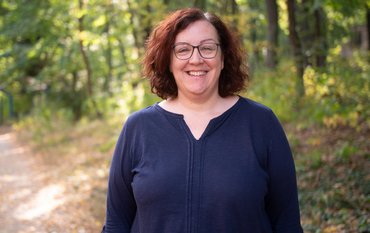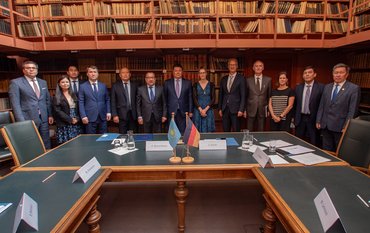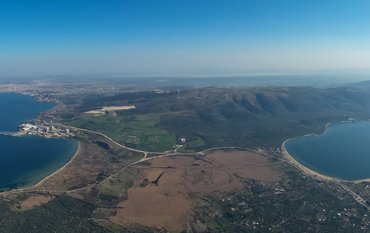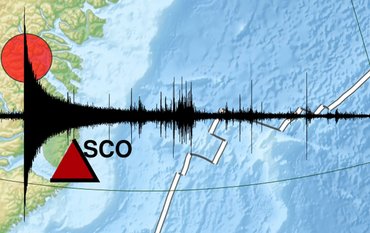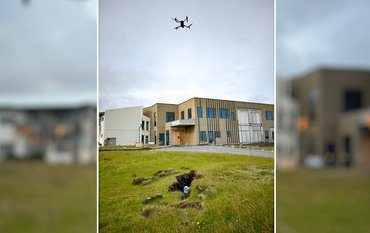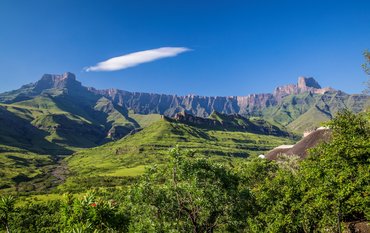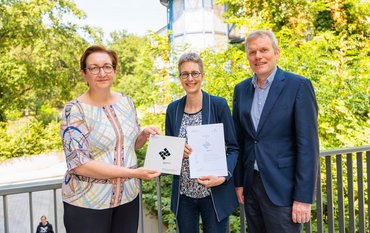"Broadening horizons" is the motto of the Helmholtz Information and Data Science Academy (HIDA) exchange programmes. Thirteen scientists whose three-month projects were funded at the GFZ are now being given this opportunity. Together with the additions from the last round of calls, we are pleased to welcome twenty scientists with HIDA funding to the GFZ in 2024.
We congratulate the following researchers on the funding of their exciting projects:
Bhadra Devadas (Indian Institute of Technology Madras) with Nivedita Sairam (Section 4.4 Hydrology)
"Data-driven Flood Risk Assessment of Commercial Assets in Europe"
Sonia Guessoum (University of Alicante) with Harald Schuh (Department of Geodesy)
"Deep Learning Networks for Celestial Pole Offsets Prediction"
Abdullahi Ibrahim (Max Planck Institute for Intelligent Systems) with Hui Tang (Section 4.7 Earth Surface Process Modelling)
"Optimal transport for real-time hazard warning system"
Haonan Jiang (Wuhan University) with Mahdi Motagh (Section 1.4 Remote Sensing and Geoinformation)
"Land subsidence in Wuhan revealed using a multi-sensor InSAR time series fusion approach"
Naghmeh Khajehali (University of Wollongong) with Hui Tang (Section 4.7 Earth Surface Process Modelling)
"Nature hazard and surface process monitoring with Federated Learning"
Muhammad Yousaf Khan (Center for Earthquake Research) with Danijel Schorlemmer (Section 2.6 Earthquake Hazards and Dynamic Risks)
"Estimation of the time-dependent seismic hazard for Pakistan and Its adjacent regions through probability and time series models"
Vahid Khosravi (Czech University of Life Sciences Prague) with Sibylle Itzerott (Section 1.4 Remote Sensing and Geoinformatics)
"Bayesian Transfer Learning with Graph Convolutional Neural Networks for Soil Organic Car-bon Prediction: from Laboratory to Spaceborne Sensing Domains"
Kwadwo Kyenkyehene Kusi (CSIR Forest Research Institute Ghana) with Martin Herold (Section 1.4 Remote Sensing and Geoinformatics)
"Developing local allometric equations for the forest savannah transition zone in Ghana using terrestrial laser scanning"
Alessandro La Rosa (University of Pisa) with Sascha Brune (Section 2.5 Geodynamic Modelling)
"Automatic fault mapping and geodetic big data for the analysis of tectonic strain"
Mina Rahmani (University of Isfahan) with Jens Wickert (Section 1.1 Geodetic Space Methods)
"Enhancing Soil Moisture Monitoring: A Hybrid Deep Learning Approach for Filling Missing Values in GNSS-R Time Series Data"
Yao Sun (Technical University of Munich) with Mahdi Motagh (Section 1.4 Remote Sensing and Geoinformatics)
"Simulating and Detecting Earthquake-Induced Building Damages in SAR Imagery"
Emixi Valdez Medina (Laval University) with Bruno Merz (Section 4.4 Hydrology)
"Integrating Social and Physical Aspects for Advanced Flood Impact Forecasting"
Jing Zou (Dresden University of Technology) with Sibylle Itzerott (Section 1.4 Remote Sensing and Geoinformatics)
"Crop growth statues index insurance design with a deep learning framework"
Expanding horizons - with HIDA
HIDA is Germany's largest postgraduate training network in the information and data sciences with the aim of promoting the transfer of knowledge in these fields within the Helmholtz Association and beyond its borders. As the umbrella organisation for the six Helmholtz Information & Data Science Research Schools, HIDA supports the training of more than 250 doctoral students at the interface between the data sciences and the Helmholtz research fields. HIDA also offers all Helmholtz young scientists attractive opportunities to train and further their education in a wide range of methods and to become part of an international data science network.
In addition, HIDA establishes international and national exchange programmes for data science talents:
With the HIDA Trainee Network, HIDA specifically enables young Helmholtz scientists to spend one to three months conducting research at another Helmholtz centre and provides them with financial support.
Parallel to this, the Helmholtz Visiting Researcher Programme is open to data scientists from other research institutions, industry or abroad. Here too, HIDA supports one to three-month guest stays at one of the 18 Helmholtz Centres.
Future calls for applications will be announced via "Projects & International Affairs". For further information on the programmes, please get in touch with the contact persons listed below.
Contact
Dr Jonas Kuppler (HIDA Liaison Officer)
Helmholtz Centre Potsdam
German Research Centre for Geosciences GFZ
Prof. Dr Frederik Tilmann (Helmholtz Incubator Officer)
Helmholtz Centre Potsdam
GFZ German Research Centre for Geosciences
Priv. Doz. Dr Wolfgang Graf zu Castell-Rüdenhausen (Head of the Department of Geoinformation)
Helmholtz Centre Potsdam
GFZ German Research Centre for Geosciences






![[Translate to English:] [Translate to English:] Abror Gafurov von dem Schriftzug "Welcome to Azerbaijan" und den UN und COP Logos](/fileadmin/_processed_/2/5/csm_2024_11_Baku_COP29_Abror_Gafurov_1042faec82.jpeg)



![[Translate to English:] Martin Herold standing in front of the library on the Telegrafenberg](/fileadmin/_processed_/c/d/csm_Martin_Herold_d385ee4dd9.jpeg)
![[Translate to English:] Many people are listening to a presentation in the GFZ lecture hall.](/fileadmin/_processed_/c/a/csm_1_Bild1_hell_b9c0e9f5ed.jpeg)





![[Translate to English:] Both scientists sitting on stools in front of a wall of books in the Telegrafenberg library](/fileadmin/_processed_/6/6/csm_Buiter_Castell_DORA_4_e87cb1ea18.jpeg)
![[Translate to English:] Gruppenbild mit 4 Personen](/fileadmin/_processed_/8/d/csm_20241017_GFZ-Emmerman-Medal-005_web_reinhardtundsommer_21a414fa4a.jpeg)






![[Translate to English:] Ice landscape with five red tents](/fileadmin/_processed_/8/9/csm_Zeltlager_auf_dem_Eis_Urheberin_Jenine_McCutcheon_5ced2d523b.jpeg)


